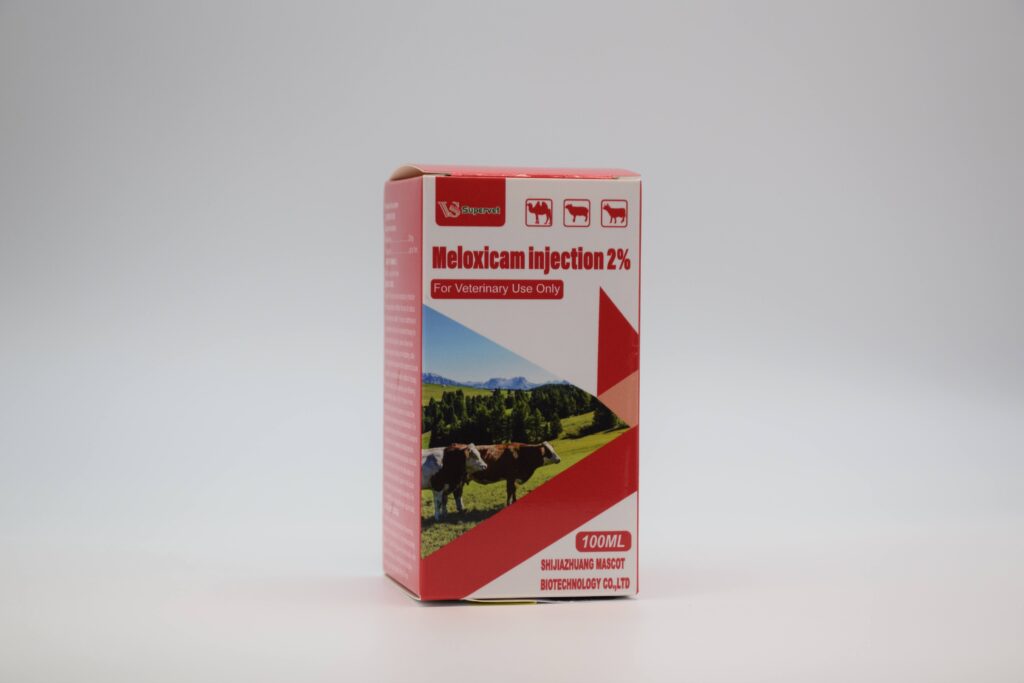
Meloxicam
Brand Name:
Meloxicam
Indications & Uses:
Inflammation, Fever, Pain
Dosage Forms:
Premix PowderTablets/Bolus, Liquid Solution, Injection Solution
Name:
Meloxicam
Common Capacity:
- Oral Suspension/Oral Solution: 10ml, 32ml, 100ml, 200ml/bottle
- Injection Solution: 10ml, 20ml, 50ml, 100ml/bottle
Common Concentration:
- Oral Suspension/Oral Solution: 1.5mg/ml
- Injection Solution: 5mg/ml
Applicable Animals:
Meloxicam is a non-steroidal anti-inflammatory drug (NSAID) with anti-inflammatory, analgesic, and antipyretic effects. Its mechanism of action primarily involves selective inhibition of cyclooxygenase-2 (COX-2), thereby reducing prostaglandin synthesis and mitigating inflammatory responses.
- Pets:
- Dogs: Primarily used for the alleviation of pain and inflammation associated with osteoarthritis. Also used for postoperative analgesia and anti-inflammation.
- Cats: Limited to single use for postoperative analgesia. Long-term use may pose significant renal toxicity to cats.
- Ruminant Animals (Cattle): Used for the alleviation of clinical signs of acute and chronic respiratory infections (e.g., bovine pleuropneumonia), or as an adjunctive treatment for enteritis and mastitis.
- Monogastric Animals (Pigs): Used for the treatment of non-infectious lameness and inflammation, e.g., adjunctive treatment for piglet diarrhea.
Usage and Dosage:
The usage and dosage of Meloxicam vary depending on the dosage form, animal species, and body weight. Strict adherence to veterinary guidance and product instructions is essential.
Oral Suspension:
- Dogs:
- Initial Dose: 0.2mg/kg body weight, orally once on the first day.
- Maintenance Dose (from second day onwards): 0.1mg/kg body weight, orally once daily.
- Administration: Can be given directly or mixed with a small amount of food. The bottle comes with a dropper or measuring spoon for accurate dosing.
- Cats:
- For single administration only, for postoperative analgesia: 0.3mg/kg body weight, administered orally once before surgery.
Injection Solution:
- Dogs:
- Initial Dose: 0.2mg/kg body weight, single subcutaneous or intravenous injection.
- Subsequent Treatment: Can be switched to oral formulation for continued maintenance therapy as needed, following the oral dosage.
- Cats:
- For single administration only, for postoperative analgesia: 0.3mg/kg body weight, single subcutaneous injection before surgery.
- Cattle (Intravenous or Subcutaneous Injection):
- Beef and Dairy Cattle: 0.5mg/kg body weight, single administration.
- Pigs (Intramuscular Injection):
- 0.4mg/kg body weight, single administration.
Dosage by Growth Stage:
- Young Animals: In young animals, especially those under 6 weeks of age, renal function is not fully developed, so Meloxicam should be used with caution or contraindicated.
- Adult Animals: Use according to the recommended dosage based on body weight and disease requirements.
- Pregnant and Lactating Animals: Use in pregnant and lactating animals requires careful assessment under veterinary guidance, as NSAIDs may delay parturition or have adverse effects on the fetus or offspring.
Applicable Diseases and Symptoms:
Meloxicam is primarily used for the alleviation of symptoms associated with inflammation and pain.
- Dogs:
- Osteoarthritis: Clinical signs such as lameness, stiffness, pain, and restricted mobility.
- Postoperative Pain and Inflammation: Pain management after orthopedic surgery, soft tissue surgery, etc.
- Cats:
- Postoperative Pain and Inflammation: Limited to single administration for acute postoperative pain management.
- Cattle:
- Acute Respiratory Infections: Respiratory symptoms accompanied by fever and inflammation.
- Acute Mastitis: Adjunctive therapy to reduce inflammation and pain.
- Diarrhea: Adjunctive therapy to reduce intestinal inflammation.
- Pigs:
- Non-infectious lameness and inflammation.
- Piglet Diarrhea: As an adjunctive treatment, can reduce inflammation and fever.
Precautions:
- Gastrointestinal Side Effects: Common side effects include vomiting, diarrhea, and appetite loss. Severe cases may develop gastrointestinal ulcers or bleeding.
- Impaired Renal Function: Avoid use in dehydrated, hypovolemic, or hypotensive animals, as this increases the risk of nephrotoxicity. Use with caution or contraindicate in animals with renal impairment.
- Impaired Hepatic Function: Use with caution or contraindicate in animals with hepatic impairment.
- Incompatibilities: Do not use concurrently with other NSAIDs or corticosteroids. Avoid concurrent use with aminoglycoside antibiotics or other nephrotoxic drugs.
- Coagulation Disorders: Use with caution in animals with bleeding disorders or those receiving anticoagulant therapy.
- Allergic Reactions: A very small number of animals may experience allergic reactions.
- Storage: Store sealed, protected from light, and out of reach of children.
Contraindications:
- Animals with hypersensitivity to Meloxicam or its excipients.
- Animals with a history of gastrointestinal ulceration, bleeding, or related conditions.
- Animals with severe renal, hepatic, or cardiac dysfunction.
- Animals with coagulation disorders.
- Pregnant and lactating cats and dogs (unless veterinarian determines benefits outweigh risks).
- Contraindicated in dogs less than 6 weeks of age or cats less than 3 months of age.
- Meloxicam should not be used long-term in cats; it is limited to single use only.
Post-Administration Care:
- Close Observation: Closely observe the animal after administration for any adverse reactions such as vomiting, diarrhea, appetite loss, lethargy, decreased urination, or difficulty urinating.
- Adequate Hydration: Ensure the animal has access to sufficient drinking water to aid renal metabolism.
- Diet Adjustment: If gastrointestinal discomfort occurs, try small, frequent meals, or provide easily digestible food.
- Regular Check-ups: For animals on long-term medication, regular blood biochemical tests (especially liver and kidney function) are recommended to monitor for potential drug side effects.
- Follow Veterinary Instructions: Strictly adhere to the veterinarian’s medication plan; do not arbitrarily stop or change the dosage. Contact a veterinarian immediately if you have any questions or adverse reactions.
Applicable Animals
Animal species suitable for this veterinary medication


